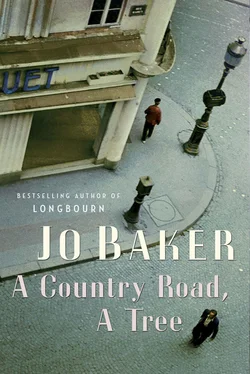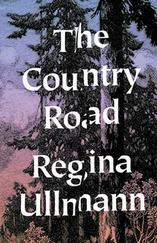The car crawls into what is left of Saint-Lô, along a road cleared through the rubble. There’s no colour here; it has been bleached out by the bombs. Dead trees stand skeletal against the grey sky. Mounds of rubble rise and fall into the distance. The town has become a desert of grey dunes, glittering with shards of glass. Here and there stand slabs of remaining wall, calling to mind those ruined English abbeys, the still, sad music of humanity, though these ruins stand not on grass but knee-deep in drifts of broken stone. Bare ruin’d choirs, where late the sweet birds sang.
And all of it done in a day by the circling Allied planes. A necessary evil is an evil nonetheless. They don’t need a new hospital here; they need a new town. There can’t be anybody living here as it is. He yells it over the rattle of the engine, over the rumble of the tyres on the rough road: “There can’t be anybody living here.”
Alan nods in contradiction.
“How?”
A shrug, a smile. “It’s desperate, though, you can see it is.”
He turns back to the window. This place is not human any more. They lurch along with the motion of the car, and he stares out at the wilderness of stone, a shiver gathering at the back of his neck. The road itself is not real. It has been cut through the rubble. They’re rattling through ghosts of houses, backyards, shops and streets. It’s a film, black and white and grey, flickering past the window; at any moment it could just snap. Flicker out into blank white and be gone.
But then colour: red, a punch of it. They’re past now, rumbling along. He cranes round to look back.
The red is hanging from the bones of a tree.
He turns right round in his seat, stares out of the back window. He can see a bundle of flesh and grey and glowing scarlet, and for a moment it’s an atrocity. But then it coalesces and is…a child’s red pullover, a boy in shorts, and an older lad in flannels, his arm wrapped around the younger child. The two of them are huddled together on a tree branch in a casual embrace, legs dangling, watching the vehicles roll into town.
The figures shrink, and slide upward to the top of the rear window, and are gone.
That instinct to take oneself up and out of the adult world, to get that distance. What they may have observed from there, these past years. The tanks rolling in and out again. The planes droning up the valley. The first bombs beginning to fall.
—
On the edge of town the road gains clarity, begins to know itself again; it slips into old habits and rises over the hillside and is gone. They park up beside a government Citroën. Everybody gets out. There’s talk, handshakes, gestures round the empty plot. On the far side of the road, a fine glossy horse stares out over the fence.
“The stores will be set up at the stud farm,” the Colonel says. “We’ve requisitioned the attics.”
The farm. A handsome building; long and low, to accommodate the horses on the ground floor. The walls are hazed with bullet holes. Not a windowpane seems to have been left unbroken.
“First job there will be to make the place secure.”
Nods. People are desperate, and there will be temptations here. Penicillin is, right now, worth more than diamonds.
“And the hospital itself,” the colonel says, “the accommodation huts and walkways, will be over here.”
They pace it out; they talk. From this point, on the edge of town, the devastation is even starker. The lush Normandy fields, the hedgerows thick with flowers and foliage, and then just turn your head and everything is grey, broken, done with. They are wasting their time — he almost says it out loud to Alan and the colonel. They have made a mistake. How can anything they do here help with this? How can anything be retrieved from here? They may as well pack up and leave. But then, grey on grey, along the rubble-swept road, something moves. A figure — a woman. Wearing a drab greenish dress, she carries a basket hooked over her arm, and carries also her distended belly in front of her like a medicine ball. He stares, and then remembers himself and goes to greet her. Explains what they are doing there, in the emollient courtesies of French. She has big famine eyes. Her hands are twigs.
“We know. We are very grateful you have come, you Irishmen. You are very welcome.”
Then she takes a bottle from her basket and hands it to him. “God bless you,” she says, and then she turns and walks away.
“And you, Madame.”
He’s left there, standing, the bottle in his hands, watching her go. From the back, she is narrow. Skinny legs, the wings of her shoulders visible even through her clothes: no hint at all that she is expecting. Fifty feet away and she pauses. He thinks she might be about to turn back, as if there’s something more she’d like to say, but she just stands there, head bent, hand to her back, catching her breath. Then she straightens up and just walks on. As though tomorrow is worth the trouble that it takes to get there.
—
The prisoners of war are marched there from some draughty detention camp a little further out along the road. French guards march with them, though they do not give the impression of being eager to escape. They all walk with the same fatigued, uncomfortable gait, as if their feet are broken. Their uniform is faded to the grit-grey of the ruins. They are the boys who should not have had to be soldiers, they are the old men who should not have had to be soldiers again. They are the very young, they are the very old, they are whoever was left to guard this stretch of the Atlantic seawall when the storm broke.
Markers for the foundations are laid out already: stakes hammered into the ground and tied with string. The architect is pacing, talking, pointing, showing around the man from the Ministry of Reconstruction. While this discussion takes place, the prisoners are allowed to fall out and rest. Overlooked still by the guard, they sink to the ground in a cluster, quiet and acquiescent.
He wanders over to them. He squats stiffly down.
“I don’t know what you’ve been told,” he says in German. “About the work you will be doing here.”
A look, a quirked eyebrow, bushy as a hedge.
“We have cleared the rubble here, we dug the graves. I think we can manage to build this little hospital for you.”
So these are the men who cut the ghost roads through the town. He nods. “You have building experience from before the war?”
The old fellow bunches his lips, shakes his head. “I don’t. But I know hospitals. I was a doctor.” He lifts his hands and turns them for inspection. Deep grained with grey, the nails blunt and matt with wear. “You wouldn’t know.”
—
He keeps his interpreting work brisk but loose, moving from French to English to German and back again as he turns between the French surveyor, the Irish staff, the German labourers. The challenge is to maintain the register as meaning is decanted out of one language and into the next; courtesy is all too easily spilt. And if it’s not there already, he might drip a little in. It’s not professional to moderate the tone like this, but then he is not a professional interpreter. And it eases, it soothes; there was a time when courtesy was a normal thing, and it helps to recall it. The ditch will be a metre deep if you please. It will be half a metre wide, if you would be so kind, sir.
The labourers take off their tunics; they work bare-chested or in vests. Thin, greyed bodies; bones on show. The staff take to handing out tea and biscuits, cigarettes, bread-and-jam. He feels that he is rich indeed. He becomes promiscuous with his cigarettes.
The prisoners of war begin to talk amongst themselves while they work, and it feels much better than that exhausted silence. Sometimes they address a remark to him. The talk makes the guard edgy, but it makes him feel at ease: the fact of it, the normality. To speak another language is to step into the other fellow’s boots. It erases difference. He tells the guard, “They’re remembering the dinners that their wives and mothers used to make.” And the guard raises his eyebrows, but nods, can understand.
Читать дальше










